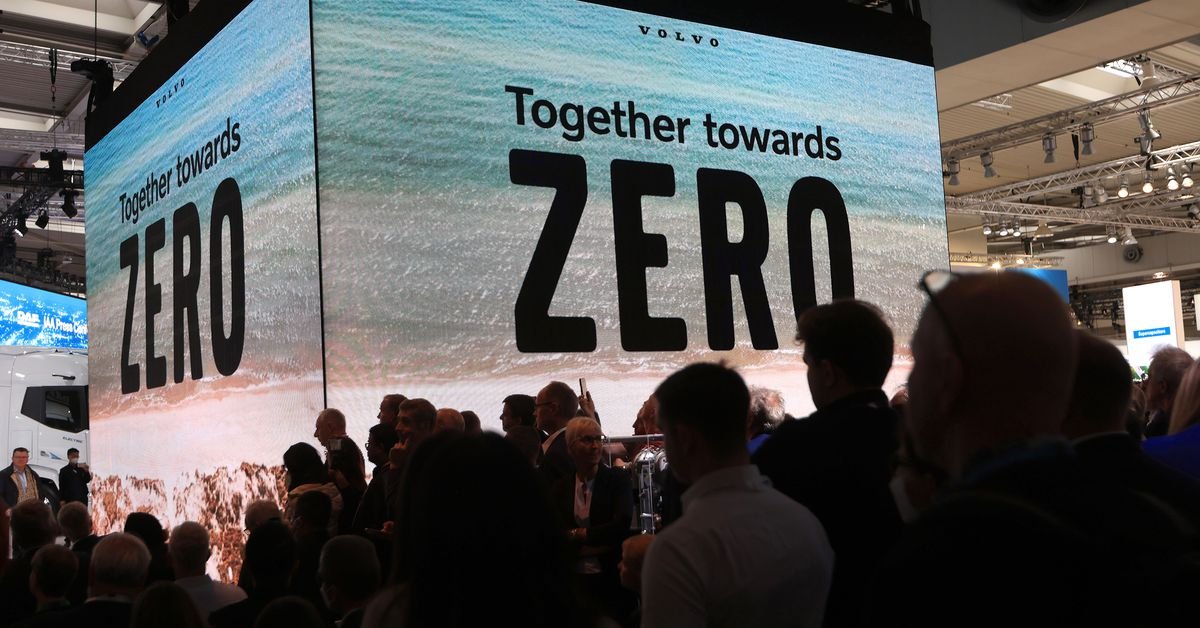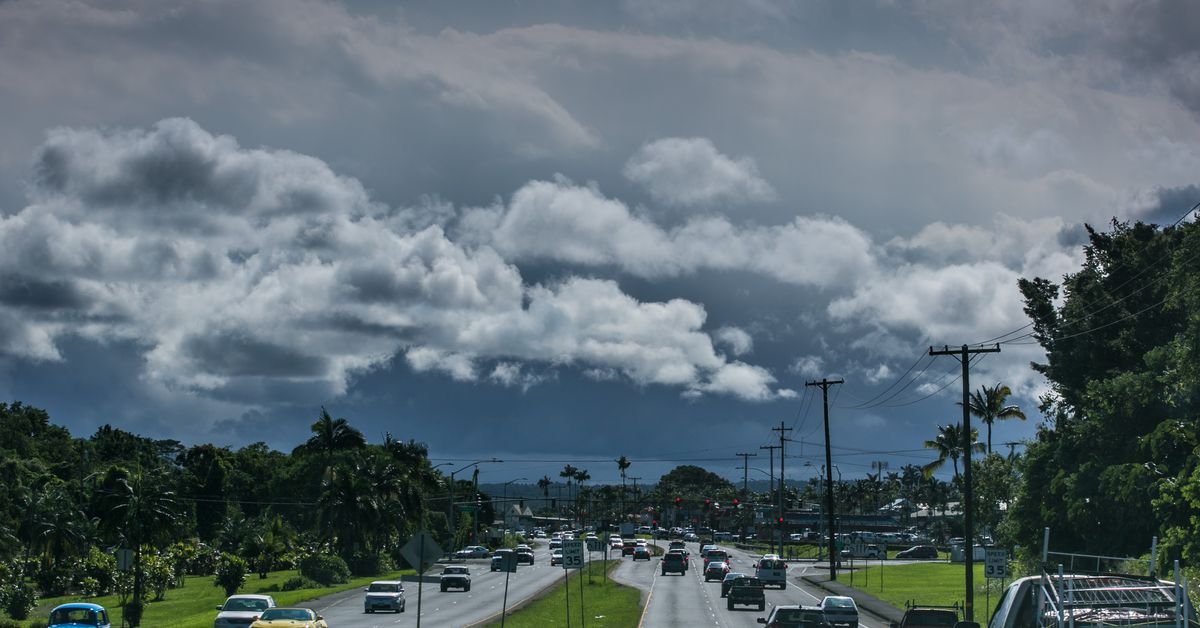Science
More than 130 companies including Ikea, Volvo ask world leaders to ‘phase out’ fossil fuels

[ad_1]
More than 130 companies, including Volvo Cars, Ikea, Unilever, Nestlé, and AstraZeneca, signed a letter calling on governments to adopt a global plan to phase out fossil fuels without carbon capture during upcoming international climate negotiations.
“Our businesses are feeling the impacts and cost of increasing extreme weather events resulting from climate change,” the letter says. “We have an important role to play in sending a clear signal about our future energy use, which is rapidly becoming cleaner through renewables.” It was coordinated by the We Mean Business Coalition that advocates for net-zero greenhouse gas emissions.
Together, the signatories represent close to $1 trillion in global annual revenue from diverse industries, from beer (Heineken) to pharmaceuticals (Bayer) and telecommunications (Vodafone Group). There are a couple of notable names in tech: eBay and Hewlett Packard Enterprise. But other tech giants that have been pretty vocal about their own climate goals — like Apple, Google, and Amazon — are absent from the list of signatories.
“Our businesses are feeling the impacts and cost of increasing extreme weather events resulting from climate change.”
It goes to show how difficult the road ahead could be to get a consensus on a global deal to ditch fossil fuels. Companies and governments are increasingly showing off their efforts to fight climate change. But many are stopping short of a commitment to no longer use the fossil fuels causing global warming — particularly those that stand to lose business from such a pact.
The signatories say they are “taking action and working toward phasing out our use of fossil fuels.” Even so, they write that they “cannot make this transition securely or efficiently alone.” That’s why they’re asking heads of state to set policies that hasten the deployment of renewable energy.
Heads of state will gather in Dubai for a United Nations climate conference that begins on November 30th. A hot topic at the summit: whether countries can agree to a plan to leave behind fossil fuels. For context, the Paris climate accord adopted by nearly 200 nations in 2015 commits them to limiting global warming to around 1.5 degrees Celsius higher than the preindustrial era. And while UN climate reports have found that greenhouse gas emissions need to drop to net zero by the middle of the century to achieve that goal, the Paris agreement doesn’t explicitly mention fossil fuels.
There’s a lot of wrangling over such a deal, which could carve out loopholes for fossil fuel production
Fast-forward to 2023, and UN Secretary-General António Guterres has said that it’s time to “establish a progressive global phase out of existing oil and gas production compatible with global net zero emissions by 2050.”
Already, there’s a lot of wrangling over such a deal, which could carve out loopholes for fossil fuel production to continue. The letter companies signed today, for example, asks governments to phase out “unabated” fossil fuels — a stipulation that many environmental advocates despise. Including the word in a deal means that power plants, factories, and other industrial facilities could continue to rely on coal, oil, or gas as long as it’s paired with controversial new technologies for capturing CO2 emissions that have yet to prove effective at scale.
The letter also asks wealthy countries to speed up their rollout of clean energy for the power sector, reaching 100 percent clean electricity by 2035. It calls for them to provide financial support to less affluent countries to help them transition to clean energy. And it says governments should establish fees for carbon pollution, and “reform and repurpose” subsidies for fossil fuels to support energy efficiency and renewables instead.
“We know that phasing out fossil fuels is the only way forward if we are to limit global warming and keep people safe from climate catastrophe,” Volvo global head of sustainability Anders Kärrberg said in a statement accompanying the letter today.
[ad_2]
Science
Starlink Mini brings space internet to backpackers

[ad_1]
SpaceX’s Starlink internet-from-space service is already available for boats, planes, vanlifers, Amazonian villages, and rural homes in over 75 countries — now it’s coming to backpackers.
The new compact DC-powered Starlink Mini is about the size of a thick laptop and integrates the Wi-Fi router right inside the dish. And despite using less power than other Starlink terminals, it can still deliver speeds over 100Mbps.
“This product will change the world,” claimed SpaceX CEO Elon Musk on X, saying it took less than five minutes to setup.
Notably, the Mini kit consumes an average of just 20-40W compared to the 33-62W we measured just two years ago with a Standard Actuated dish and separate AC-powered Wi-Fi router. That means you can power the Mini dish for two to three hours from something like an Anker Prime 27,650mAh (99.54Wh) power bank, or a little over an hour with smaller 10,000mAh (40Wh) portable batteries you probably already have laying about. It requires a USB-C PD power source with a minimum rating of 100W (20V/5A).
The Mini dish measures 11.75 x 10.2 x 1.45 inches (298.5 x 259 x 38.5mm) and weighs just 2.43 pounds (1.1kg), or 3.37 pounds (1.53kg) with the 49.2 foot (15m) DC power cable and kickstand. It has an IP67 rating meaning it’s protected from dust and rain, including short periods of water immersion.
In the US, Starlink Mini is an add-on to Residential plans — at least for now. The Mini kit costs $599 which is $100 more than the standard dish, and will cost an extra $30 per month to add the Mini Roam service to existing $120 Residential plans. That gives Starlink Mini users up to 50GB of mobile data each month, with the option to purchase more for $1 per GB, according to early-access invitations sent to some exiting US Starlink customers.
While Starlink Mini is new to the US, a Starlink support page says it’s already available in Colombia, El Salvador, Guatemala, and Panama where it can be purchased with Mini Service or Mobile – Regional Service plans. In those countries, there’s no data or speed caps to use Mini, and in-motion and ocean use is not allowed. SpaceX says it’ll expand to more markets over time.
“Our goal is to reduce the price of Starlink, especially for those around the world where connectivity has been unaffordable or completely unavailable,” reads the Starlink support page. “In regions with high usage, like the US, where Starlink Mini places additional demand on the satellite network, we are offering a limited number of the Starlink Mini Kits to start at a higher price point.”
As a standalone service, Starlink Mini could be transformative for anyone in need of an inexpensive and sharable internet service that efficiently sips DC battery power. This includes families that depend upon a cobbled together solar generator for power, a squad of soldiers trying to fight back an invasion, or just bikepackers and overlanders taking the road less traveled.
[ad_2]
Source link
Science
Elon Musk has another secret child with exec at his brain implant company

[ad_1]
Elon Musk, who has long touted claims about the world’s supposed depopulation crisis, had another child with an executive at his brain implant company Neuralink, according to a report from Bloomberg. Neuralink director Shivon Zilis reportedly had the child with Musk earlier this year.
As noted by Bloomberg, Musk has repeated that line several times in the past, including during a 2022 interview with Tucker Carlson and again during an interview at the Milken Institute conference in May. He told Carlson “a collapsing birth rate is the biggest danger civilization faces, by far.” In 2021, Musk’s nonprofit organization donated $10 million to the University of Austin to fund the Population Wellbeing Initiative, a research group that studies the human population.
The revelation also follows multiple reports alleging inappropriate conduct from Musk in the workplace and with subordinates. A recent report from The Wall Street Journal said Musk had a sexual relationship with a former SpaceX intern who later became one of the company’s executives. Another employee says she refused Musk’s requests to have children with him several times, according to the Journal.
[ad_2]
Source link
Science
Youth plaintiffs in Hawaii reach historic climate deal

[ad_1]
A group of young plaintiffs reached a historic climate settlement with the state of Hawaii and Hawaii Department of Transportation in a deal that will push the state to clean up tailpipe pollution.
The 13 youth plaintiffs filed suit in 2022 when they were all between the ages of 9 and 18. In the suit, Navahine F. v. Hawaii Department of Transportation (HDOT), they alleged that the state and HDOT had violated their right to “a clean and healthful environment,” which is enshrined in Hawaii’s constitution.
“We got what we came for, and we got it faster than we expected.”
The settlement, reached on Thursday, affirms that right and commits the DOT to creating a plan to reach zero greenhouse gas emissions from transportation by 2045. To hit that goal, the state will have to dedicate at least $40 million to building out its EV charging network by the end of the decade and complete new pedestrian, bicycle, and transit networks over the next five years. The settlement also creates a new unit within HDOT tasked with coordinating CO2 emission reductions and a volunteer youth council to advise HDOT.
“I am so proud of all the hard work to get us to this historic moment. We got what we came for, and we got it faster than we expected,” the lead plaintiff, Navahine F., said in an emailed statement.
Back in 2018, Hawaii committed to reaching net-zero carbon dioxide emissions by 2045 — in line with what climate research determined was necessary to meet the Paris climate accord goal of stopping global warming. But the state wasn’t doing enough to reach that goal, the plaintiffs alleged. Transportation makes up the biggest chunk of the state’s greenhouse gas pollution.
“Climate change is indisputable,” Ed Sniffen, HDOT director of transportation, said in a press release. “Burying our heads in the sand and making it the next generation’s problem is not pono.”
Youth in Montana scored another historic legal win last year after the first climate case of its kind to go to trial. A state court found that a Montana policy that barred officials from considering the consequences of climate change when permitting new energy projects violated the rights of the plaintiffs to a “clean and healthful environment.” The lawsuit in Hawaii was expected to be the next landmark youth climate case to go to trial in the US. Several other state and federal youth climate suits are still pending in the US.
[ad_2]
Source link
-

 Startup Stories9 months ago
Startup Stories9 months agoWhy Millennials, GenZs Are Riding The Investment Tech Wave In India
-

 Startup Stories9 months ago
Startup Stories9 months agoStartups That Caught Our Eyes In September 2023
-

 Startup Stories9 months ago
Startup Stories9 months agoHow Raaho Is Using Tech To Transform India’s Fragmented Commercial Trucking
-

 Startup Stories8 months ago
Startup Stories8 months agoMeet The 10 Indian Startup Gems In The Indian Jewellery Industry’s Crown
-

 Crptocurrency4 months ago
Crptocurrency4 months agoLither is Making Crypto Safe, Fun, and Profitable for Everyone!
-

 Startup Stories9 months ago
Startup Stories9 months agoHow Volt Money Is Unlocking The Value Of Mutual Funds With Secured Lending
-

 E-commerce9 months ago
E-commerce9 months agoTop Online Couponing Trends To Watch Out For In 2016
-

 Startup Stories9 months ago
Startup Stories9 months agoWhy Moscow-Based Kladana Considers Indian SME Sector As The Next Big Market For Cloud Computing




